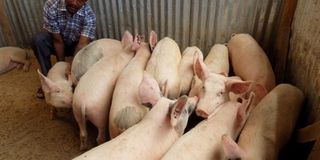Why I chose pigs over rental houses

Muhoro Mwai in his pig farm in Kayole, Nairobi. The farmer keeps 140 pigs that he sells to traders. PHOTO | RACHEL KIBUI |
What you need to know:
- Mwai keeps 140 animals in Nairobi, a venture that earns him more money than houses.
The 25 by 60ft plot in Kayole in Nairobi resembles many others in the populous estate.
It is surrounded by a concrete wall to enhance security and atop the walls one can see iron sheet structures.
The plot, however, is not occupied by people but pigs. Muhoro Mwai, 35, keeps 140 pigs that include boars, sows and piglets.
But that is not all, he also has space for four dairy cows and indigenous chickens.
On this Sunday morning when the Seeds of Gold team visits him, Muhoro is busy serving two clients.
One of them has travelled from Uthiru to buy a sow while the other, a butcher, wanted to buy a boar.
Muhoro mainly feeds the pigs rice bran that he sources cheaply from Mwea.
“I buy 70kg of rice bran at Sh450 from Mwea Irrigation Scheme while the same goes for Sh1,600 in Nairobi.”
He mixes the rice bran with pollard, maize germ, mineral supplements and molasses. He also offers them cabbage waste that he buys from Wakulima market in Nairobi at between Sh100 and Sh150 per bag.
The pigs are fed once a day and supplied with clean water.
“By the time I sell them to butchery operators at seven months at between Sh15,000 and Sh25,000, the pigs weigh an average of 50kg. I decided to sell the pigs directly to the traders to cut brokers who were offering low prices,” says Muhuro, who went into the business three years ago after realising building rental units would not earn him much.
On the other hand, he sells a three-month piglet at Sh15,000 and an expectant sow at Sh40,000.
From the one-room houses he wanted to built, he would get Sh1,000 a month rent from each, which cannot be compared to the money he gets from pigs.
He bought his first stock of three sows at Sh100,000. The animals calved down 11 piglets each increasing his brood faster.
He has constructed storey pens for the pigs ensuring he has enough space for chickens and cows.
DAILY REPORTS
His four dairy cows are housed in a 25 by 12 feet unit which he notes is adequate as it allows them some room to exercise.
He feeds the animals napier grass, molasses and hay that he buys in Kiambu and Njiru.
Muhoro gets 15 litres of milk a day from the two cows.
“The cows are not a commercial venture. I keep them to provide milk for my family,” he says, adding, “The same case applies to my over 30 indigenous chickens that provide eggs and meat.”
Muhoro has employed two workers and cleans the pigsties and cow pens daily to manage waste.
“Every morning I pass by the farm to get daily reports on how the animals are faring,” says Muhoro, who besides farming runs a beer distribution business.
Joseph Mwaniki, a veterinary technician based in Nairobi, says pigs are ideal animals for urban farming because they do not require a lot of space.
“The boars should be castrated if they are not meant for mating to ensure they do not waste a lot of energy chasing after sows,” says Mwaniki.
He adds that farmers should always feed their pigs with quality feeds to avoid parasites and diseases. The animals should also be dewormed after every two months to ensure they are healthy.
This further guarantees the worms are not passed to human beings.
Before weaning, piglets should be left to breastfeed exclusively for at least two months.
“Offering the pigs sweet potato vines, cabbages and other vegetables helps the them in digestion because green matter is a good source of fibre.”





